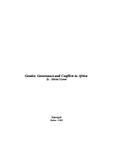| dc.description.abstract | "Civil War is Africa's self-inflicted wound. More than one African in five lives in a country
that is fighting a war, and nearly 20 countries have experienced civil war since 1960. The
continuing conflicts that ravage the African continent represent a heavy social and economic
burden. During a war, most of the country's resources tend to be diverted away from
development and towards supporting the conflict — War is estimated to cost $1bn per year in
Central Africa, without counting the cost of aiding refugees, which is estimated to be about
$500m in the region" (Bolle, 2000: 61).
"Women's contributions to war and peace have long been underestimated. In fact, women
often contribute to the outbreak of violence and hostilities—in many cases, they are
instrumental in inciting men to defend group interests, honour, and collective livelihoods.
Women also play a key role in preserving order and normalcy in the midst of chaos and
destruction. In times of conflict, when men engage in war and are killed, disappear or take
refuge outside their country's borders, it is women who are left with the burden of ensuring
family livelihood. Women struggle to protect their families health and safety—a task which
rests on their ability to cope pragmatically with change and adversity. It is therefore not
surprising that women are also a driving force for peace" (Sorensen, 1998: iii).
"Women's under-representation or lack of involvement in official efforts at resolving internal
state conflicts is taken as a given in most situations. While they often bear the brunt of the war
brutalities, and are increasingly involved in combatant activities, they are seldom part of the
inner circles of peace negotiations, peace accords, or policies at the formal level to resolve
conflict" (Boyd, 1994: 3).
The above three quotes basically summarize the main thesis of this paper, which argues that
most of Africa's conflicts and related disasters are self inflicted wounds arising from bad/
undemocratic governance, partially manifested in gender inequities in the structures and
processes of public governance, which in turn are reflected in the near absence of women's
voices in key decision-making on strategic issues, including those regarding war and peace.
This paper further argues that the question of resolving, managing and meaningfully
addressing post-conflict reconstruction, cannot be divorced from the question of governance,
as sustainable peace cannot be assured in the absence of a conducive governance framework.
The paper also argues that despite women's marginality at the war-mongering tables, they are
not only victims of war and other forms of violence, they are also active participants before,
during and after civil war, serving as instigators, combatants, service providers, and
reconstructors of the post-war battered political-economy and society. But in all of these roles,
most of women's peace initiatives take place outside the formal governance frameworks, and
hence their long term impact/influence on the overall objective of sustainable peace, cannot
easily be determined. The paper therefore makes recommendations that suggest the vital need
in all African countries for democratic governance and, for greater participation of women in
key positions of decision-making, including the military and other security related institutions. | en |

